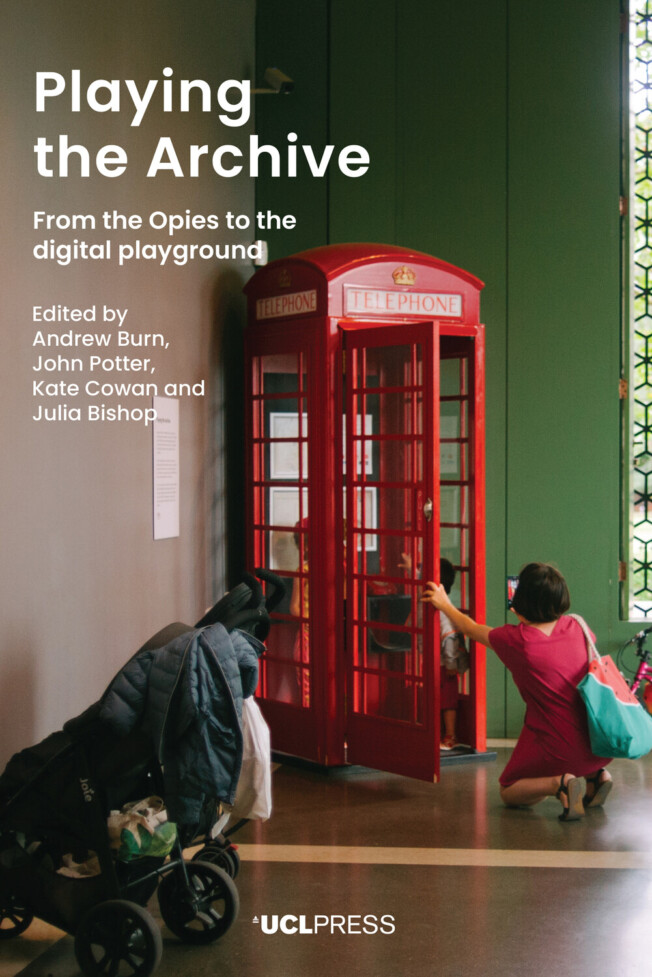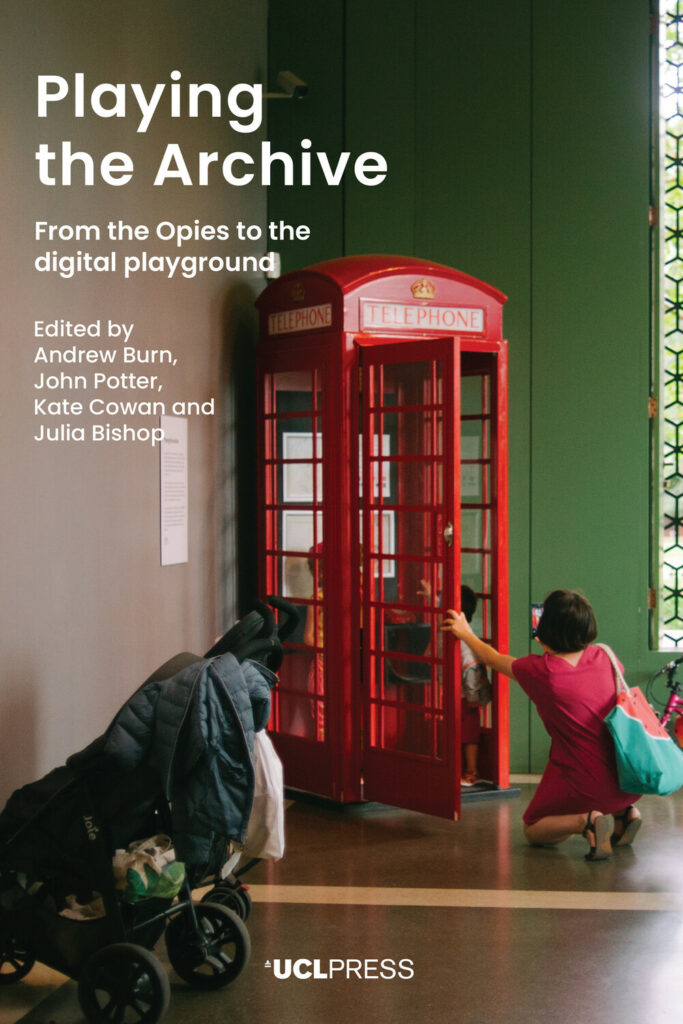
Playing the Archive
From the Opies to the digital playground
Andrew Burn (Editor), John Potter (Editor), Kate Cowan (Editor), Julia Bishop (Editor)
Playing the Archive: From the Opies to the digital playground reflects on a major study inspired by the work of citizen scholar folklorists Iona and Peter Opie. In the 1950s and 1960s, the Opies built a vast collection of children’s street and playground games, stories, sayings, rhymes, beliefs and habits as told to them by children all over Britain. These accounts are now held in the Bodleian Libraries and were the focus and inspiration for the new study. New stories and games were gathered from today’s children, and comparisons drawn between play experiences at these two different points in time.
The book explores how the Opie Archive was made publicly available online by the project through digital images, innovative cataloguing and playful digital media interfaces, such as a red telephone kiosk at the Young V&A. Chapters analyse the ethnographic strands of the project, collecting evidence of new and old forms of play on today’s playgrounds using state-of-the-art digital methods. The book proposes new ways of thinking about changes and adaptations to play and games, theorising on the workings of interfaces, repertoires and archives. It also considers the Opies’ ways of working, landscapes of play over time, and intergenerational dialogue about play. The collection presents research evidence and theory which speak back to the often reductive public discourse around children’s play and digital media. It positions children as creative, agentive and engaged participants in their play cultures.
Praise for Playing the Archive
‘This book flies in the face of the narrative of decline which, in this field, states that children don’t play any more. Only with patient and innovative research can we adults get near to what children are doing now, and compare it with the research and memories of the past. Call it anthropology, sociology, folklore or ethnography if you will, this book does all of this.’
Michael Rosen, Goldsmiths, University of London
‘*Knock knock. Who’s there? Opie. Opie who? Opie gives me my book back. Fans of children’s play, children’s folklore history, and the scholarly legacy of Iona and Peter Opie need this book in their library. I really do want my book back.’
*Anna Beresin, formerly of University of the Arts, Philadelphia
List of figures
List of contributors
Preface
Acknowledgements
1 Play: archive, interface, repertoire
Andrew Burn
PART I: The people in the archive
2 Folklore, friendships and reciprocity: hearing the epistolary relationships in the multi-vocal archive of Iona and Peter Opie
Catherine Bannister, Julia Bishop and Alison Somerset-Ward
3 Hopscotching the Opies: playing (with) the archive in Bloomsbury
Michael Eades
4 Half-belief and ‘belief play’ in the haunted primary school: children’s supernatural play in a digital era
Catherine Bannister, Julia Bishop and Kate Cowan
PART II: Capturing play
5 Research as play
Kate Cowan, John Potter and Valerio Signorelli
6 Play and digital media: laminates, frames and lifeworlds
John Potter and Kate Cowan
7 From interfaces to memories: re-constructing and transmitting memories of play
Valerio Signorelli, Leah Lovett, Andy Hudson-Smith and Duncan Hay
PART III: Play in space and time
8 Spaces for play: beyond streets and playground
Helen Woolley and Alison Somerset Ward
9 Meshwork, playlines and palimpsests: a tracing of play over time
Jackie Marsh and Julia Bishop
10 Crossing the generational divide in play: individual and collective memories in conversation
Julia Bishop
PART IV: Future play
11 Ludic time travel: from the archive to the digital playground and the Play Observatory
John Potter and Kate Cowan
Index
DOI: 10.14324/111.9781800083745
Number of illustrations: 47
Publication date: 10 April 2025
PDF ISBN: 9781800083745
EPUB ISBN: 9781800083776
Read Online ISBN: 9781800083745
Hardback ISBN: 9781800083769
Paperback ISBN: 9781800083752
Andrew Burn (Editor)
Andrew Burn is Emeritus Professor of English, Media and Drama at the UCL Institute of Education.
John Potter (Editor)
John Potter is Professor of Media in Education at UCL Institute of Education.
Kate Cowan (Editor)
Kate Cowan is an Honorary Senior Research Fellow at UCL Institute of Education.
Julia Bishop (Editor)
Julia Bishop is a Research Associate at the University of Sheffield School of Education.
‘read the book and be impressed’
Folklore
‘This book flies in the face of the narrative of decline which, in this field, states that children don’t play any more. Only with patient and innovative research can we adults get near to what children are doing now, and compare it with the research and memories of the past. Call it anthropology, sociology, folklore or ethnography if you will, this book does all of this.’
Michael Rosen, Goldsmiths, University of London
‘Knock knock. Who’s there? Opie. Opie who? Opie gives me my book back. Fans of children’s play, children’s folklore history, and the scholarly legacy of Iona and Peter Opie need this book in their library. I really do want my book back.’
Anna Beresin, formerly of University of the Arts, Philadelphia
Related titles
Playing the Archive
From the Opies to the digital playground
Playing the Archive: From the Opies to the digital playground reflects on a major study inspired by the work of citizen scholar folklorists Iona and Peter Opie. In the 1950s and 1960s, the Opies built a vast collection of children’s street and playground games, stories, sayings, rhymes, beliefs and habits as told to them by children all over Britain. These accounts are now held in the Bodleian Libraries and were the focus and inspiration for the new study. New stories and games were gathered from today’s children, and comparisons drawn between play experiences at these two different points in time.
The book explores how the Opie Archive was made publicly available online by the project through digital images, innovative cataloguing and playful digital media interfaces, such as a red telephone kiosk at the Young V&A. Chapters analyse the ethnographic strands of the project, collecting evidence of new and old forms of play on today’s playgrounds using state-of-the-art digital methods. The book proposes new ways of thinking about changes and adaptations to play and games, theorising on the workings of interfaces, repertoires and archives. It also considers the Opies’ ways of working, landscapes of play over time, and intergenerational dialogue about play. The collection presents research evidence and theory which speak back to the often reductive public discourse around children’s play and digital media. It positions children as creative, agentive and engaged participants in their play cultures.
Praise for Playing the Archive
‘This book flies in the face of the narrative of decline which, in this field, states that children don’t play any more. Only with patient and innovative research can we adults get near to what children are doing now, and compare it with the research and memories of the past. Call it anthropology, sociology, folklore or ethnography if you will, this book does all of this.’
Michael Rosen, Goldsmiths, University of London
‘*Knock knock. Who’s there? Opie. Opie who? Opie gives me my book back. Fans of children’s play, children’s folklore history, and the scholarly legacy of Iona and Peter Opie need this book in their library. I really do want my book back.’
*Anna Beresin, formerly of University of the Arts, Philadelphia
‘read the book and be impressed’
Folklore
‘This book flies in the face of the narrative of decline which, in this field, states that children don’t play any more. Only with patient and innovative research can we adults get near to what children are doing now, and compare it with the research and memories of the past. Call it anthropology, sociology, folklore or ethnography if you will, this book does all of this.’
Michael Rosen, Goldsmiths, University of London
‘Knock knock. Who’s there? Opie. Opie who? Opie gives me my book back. Fans of children’s play, children’s folklore history, and the scholarly legacy of Iona and Peter Opie need this book in their library. I really do want my book back.’
Anna Beresin, formerly of University of the Arts, Philadelphia

